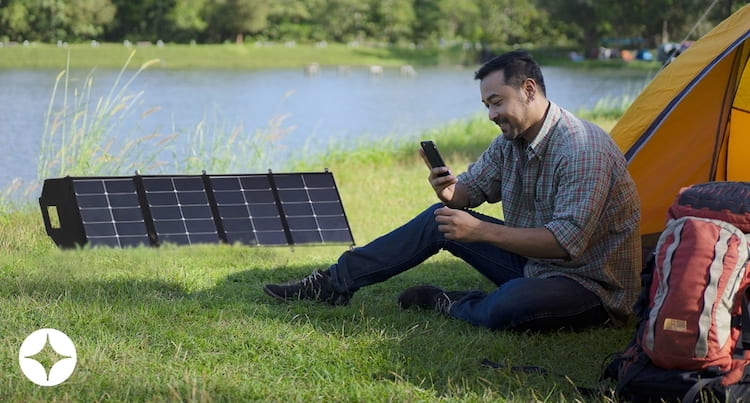
Pictured: Solar Panel Charger for Portable Outlet Backup Battery
Camping is a popular summertime activity that gives you the chance to slow down, spend some time in nature, and enjoy quality time with family and friends. However, the change in routine and venue can disrupt your sleep if you aren't careful.
Getting a good night's sleep is important for peak brain performance, mood regulation, relationships and overall health. Deficient sleep can contribute to the development of numerous chronic health issues and leave you physically vulnerable. Since sleep is such a vital part of your well-being, it's critical to get plenty of rest, especially when you venture out into the woods for a camping trip. Fortunately, you can rest easy, even while on the go, by following a few simple tips.
How to Create the Ideal Sleep Environment While Camping
Many people think of camping with a romantic notion of sleeping peacefully under a gorgeous canopy of stars. Nature does indeed provide quite a few helpful sleeping aids crucial to good quality sleep:
- Natural sleep sounds like crickets, river water, and wind
- Cool nighttime temperatures
- Darkness
- Lack of distracting electronics
Despite these, the reality of tent camping requires some careful planning to prepare for optimal sleeping conditions. Consider the following factors to make yourself comfortable and fully enjoy your summertime adventure.
1. Choose Your Tent Site With Care
This simple step can make or break your camping experience. Find a level spot so you can lay comfortably without sliding or rolling. Before you pitch the tent, remove any rocks and sticks from the ground that would be uncomfortable to lay on. Try to place your tent in an area sheltered from the sun and wind. Finally, vent your tent to improve airflow and prevent condensation from building up and creating dampness.
It's also a good idea to check your tent for holes and leaks before you leave home. Make sure the rain cover is in good condition and the waterproofing still works. There's nothing worse than waking up in a wet tent with soggy bedding and clothing.
2. Plan Ahead for Sleep Therapy Needs
Campers that use sleep equipment have unique challenges when it comes to outdoor sleeping. Fortunately, SoClean makes it easy to power and transport your equipment with ease. Use the portable battery outlet and its solar power charger to keep your sleep equipment running seamlessly. Plus, this convenient travel case is the ideal solution to bring your SoClean along without risking damage or losing any parts.
3. Get Off the Ground
Sleeping on the ground makes it difficult for most people to get adequate rest, especially if you aren't used to doing so. Even the most comfortable sleeping bag can't hide the fact that you're lying on the cold, hard ground. For great sleep, the better approach is a full sleep system geared toward your individual comfort preferences.
Choose an air mattress, sleeping pad, or cot to provide a cushion from the ground. Complete your sleep setup with a pillow, sheets and blankets, or a sleeping bag. The setup that suits you best depends on your preferred sleeping temperature. Sheets and blankets give you more freedom to add or remove layers to adjust the temperature. Sleeping bags come in many styles and are capable of providing various levels of warmth. Select one appropriate to handle the temperatures you expect to encounter on your trip. Too little warmth will leave you shivering all night, while too much can make you equally as uncomfortable.
4. Keep the Bugs at Bay
Nothing can interrupt your sleep like irritating insects; especially mosquitoes. The sound of their buzzing is annoying, but the itchy bites they leave behind can ruin your attempts to get some rest. Don't let these nuisances invade your tent. Take measures to deter them by inspecting your tent's mosquito netting to ensure it's free of holes. Keep the screen door zipped closed at all times. Store food in sealed containers and clear away garbage. You can also use mosquito-repellent candles, essential oils, or even a portable bug zapper light.
4. Stick to Your Regular Bedtime Routine
Adhere to your normal bedtime and wake-up time as closely as possible. You will sleep easier when you don't fight your body's natural sleep rhythms. Sleeping outdoors may require that you make a few adjustments to stay on schedule. If you find the sounds of nature distracting you can wear earplugs or use a white noise machine. Wear an eye mask if you hate the idea of an early wake-up call with the sunrise.
With some good planning and attention to the important details, you can rest just as comfortably on your camping adventure as you do in your own bed at home. Follow the above tips and let nature do its part to lull you into a peaceful, restful sleep that leaves you feeling refreshed and energized for the next day's fun.




